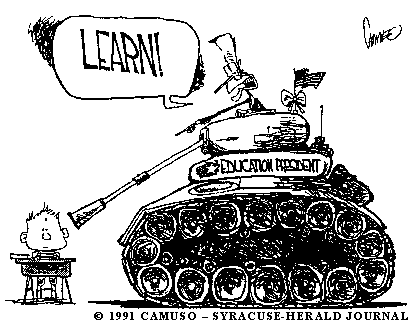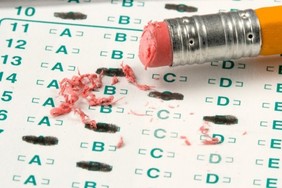The image above is from Standardized Testing - the Musical. Order scripts here. Find more resources below this article!
Standardized Testing
When it comes to education, we somehow threw out the baby with the bath water when our schools were transformed from "places of learning" to "test prep and testing centers"!
This transformation was not initiated by educators, it was not approved by educators and it has been strongly resisted by many educators. However, between the forces of the federal government and the corporations who stood to make massive profits, education lost. Educators lost.
Worst of all - children lost. Many of our finest teachers left the profession. They knew that what this was doing to children was wrong, and they had no intention of participating in this process.
When NCLB was enacted in 2002 I actually thought that it was so insane that it would certainly not survive. Well, I was dead wrong. It's been nearly 15 years of continual dismantling of teaching and learning. We can now look back over the years and see the road strewn with the wreckage.
There would be no point to this post if it weren't for the fact that the inertia of standardized testing mania is continuing to cause harm. In December of 2016 the NCLB was finally thrown out. In it's place is the ESSA - Every Student Succeeds Act. Will it be an improvement? While it does give more control back to the states, I doubt it will improve education. In the meantime, there are those at the federal level who are now attempting to insert into the ESSA the same punitive measures and threats that were in the NCLB.
This transformation was not initiated by educators, it was not approved by educators and it has been strongly resisted by many educators. However, between the forces of the federal government and the corporations who stood to make massive profits, education lost. Educators lost.
Worst of all - children lost. Many of our finest teachers left the profession. They knew that what this was doing to children was wrong, and they had no intention of participating in this process.
When NCLB was enacted in 2002 I actually thought that it was so insane that it would certainly not survive. Well, I was dead wrong. It's been nearly 15 years of continual dismantling of teaching and learning. We can now look back over the years and see the road strewn with the wreckage.
There would be no point to this post if it weren't for the fact that the inertia of standardized testing mania is continuing to cause harm. In December of 2016 the NCLB was finally thrown out. In it's place is the ESSA - Every Student Succeeds Act. Will it be an improvement? While it does give more control back to the states, I doubt it will improve education. In the meantime, there are those at the federal level who are now attempting to insert into the ESSA the same punitive measures and threats that were in the NCLB.

Like vegetables pickling in a jar, it's almost as though education has been marinating in this fallacious paradigm for so long that we've lost sight of what education is all about.
Education - schooling - does not exist for the purpose of raising test scores, and certainly not for tests that measure nothing but how many facts students can memorize (temporarily). The tests are measuring something that is no longer relevant.
As recently as five or ten years ago, most students did not have all the facts at their fingertips and in their pockets.
And, until very recently, students were not allowed to bring devices to school that connected with the Internet; many educators considered that students were cheating if they looked up information online. They did not realize at the time that if curriculum and assessment are designed properly it is literally impossible for students to cheat. However, most students now have access to all this knowledge 24 hours a day. They do not need to memorize it. And, rather than banning these tools, many schools are now implementing BYOD programs - "bring your own device" to school.
What students do need is to learn how to use the knowledge, and that is what assessment should be about. We need to let students have the freedom and the time to be creative, and then we must allow them to demonstrate what they can do with the knowledge which they have constructed through inquiry, experience, trial and error.
In an inane effort to raise test scores, we simply ran off and left behind everything we knew about pedagogy, learning theory and child development. These are among the "babies" that got thrown out with the bath water.
I'm not sure what the "bath water" was. Apparently it was the supposed bad schools, bad teachers and the resulting low standardized test scores. Therefore, it made sense to someone to try to increase standardized test scores by creating, then enforcing, tougher laws - aimed at educators. These included sanctions, or threats, of possibilities ranging from cuts in pay to loss of jobs, loss of funding and even closing schools or turning them over to the government to run.
Education - schooling - does not exist for the purpose of raising test scores, and certainly not for tests that measure nothing but how many facts students can memorize (temporarily). The tests are measuring something that is no longer relevant.
As recently as five or ten years ago, most students did not have all the facts at their fingertips and in their pockets.
And, until very recently, students were not allowed to bring devices to school that connected with the Internet; many educators considered that students were cheating if they looked up information online. They did not realize at the time that if curriculum and assessment are designed properly it is literally impossible for students to cheat. However, most students now have access to all this knowledge 24 hours a day. They do not need to memorize it. And, rather than banning these tools, many schools are now implementing BYOD programs - "bring your own device" to school.
What students do need is to learn how to use the knowledge, and that is what assessment should be about. We need to let students have the freedom and the time to be creative, and then we must allow them to demonstrate what they can do with the knowledge which they have constructed through inquiry, experience, trial and error.
In an inane effort to raise test scores, we simply ran off and left behind everything we knew about pedagogy, learning theory and child development. These are among the "babies" that got thrown out with the bath water.
I'm not sure what the "bath water" was. Apparently it was the supposed bad schools, bad teachers and the resulting low standardized test scores. Therefore, it made sense to someone to try to increase standardized test scores by creating, then enforcing, tougher laws - aimed at educators. These included sanctions, or threats, of possibilities ranging from cuts in pay to loss of jobs, loss of funding and even closing schools or turning them over to the government to run.

LEARN !!!
Actually, this mania began long before NCLB. Standardized testing mania had been going on in Texas since the early 1980's.
If it wasn't obvious at the time that high stakes standardized testing was a bad idea, surely it should be apparent by now. Just look at the results, well documented in the research, of any significant improvement over the last three to four decades of education"reform" measures, including the standardized testing mania that has engulfed education.
It these reforms and pressures to raise test scores have not succeeded in forty years, isn't it time to try doing something that makes sense? Isn't it time to look again at what we know - or should know - about learning theory, curriculum theory and child development and shouldn't we be examining and duplicating pedagogies that actually work?
Research indicates that students in 2013 were spending 20 to 50 hours per year taking tests, and up to 60 to 110 hours per year prepping for tests[i]. Stress levels among students, teachers and parents as a result of this practice are high.
A growing anti-testing movement is gaining momentum. Parents, students and teachers are taking action and are saying no [ii] to the eradication of learning as schools have been forcibly transformed into test-prep centers. The new ESSA is still focusing on issues such as accountability, which is tied to standardized tests scores.
Actually, this mania began long before NCLB. Standardized testing mania had been going on in Texas since the early 1980's.
If it wasn't obvious at the time that high stakes standardized testing was a bad idea, surely it should be apparent by now. Just look at the results, well documented in the research, of any significant improvement over the last three to four decades of education"reform" measures, including the standardized testing mania that has engulfed education.
It these reforms and pressures to raise test scores have not succeeded in forty years, isn't it time to try doing something that makes sense? Isn't it time to look again at what we know - or should know - about learning theory, curriculum theory and child development and shouldn't we be examining and duplicating pedagogies that actually work?
Research indicates that students in 2013 were spending 20 to 50 hours per year taking tests, and up to 60 to 110 hours per year prepping for tests[i]. Stress levels among students, teachers and parents as a result of this practice are high.
A growing anti-testing movement is gaining momentum. Parents, students and teachers are taking action and are saying no [ii] to the eradication of learning as schools have been forcibly transformed into test-prep centers. The new ESSA is still focusing on issues such as accountability, which is tied to standardized tests scores.

The Industrial Revolution is Gone!
What we are doing today may have been deemed appropriate for the Industrial Revolution. But, we are far beyond those days, and that structure, the factory model, is now totally obsolete. We are also past the Knowledge Era, and we are well into the Innovation Age.
We cannot prepare our students for success in the Innovation Age if we are still trying to force fit them back into the Industrial Age, or factory model, of education. We are trying to make the factory model of education prepare students for successful lives in the 21st century.
What we are doing today may have been deemed appropriate for the Industrial Revolution. But, we are far beyond those days, and that structure, the factory model, is now totally obsolete. We are also past the Knowledge Era, and we are well into the Innovation Age.
We cannot prepare our students for success in the Innovation Age if we are still trying to force fit them back into the Industrial Age, or factory model, of education. We are trying to make the factory model of education prepare students for successful lives in the 21st century.

Rumpelstiltskin Effect . . .
What is happening in education today is a bit like trying to spin straw into gold, and we have no Rumpelstiltskin!
It is time for real change - right now!
At what cost are we continuing to make education about standardized test scores?
What is happening in education today is a bit like trying to spin straw into gold, and we have no Rumpelstiltskin!
It is time for real change - right now!
At what cost are we continuing to make education about standardized test scores?
References
[i] Nelson, Howard. Testing More, Teaching Less – What America’s Obsession with Student Testing Costs in Money and Less Instructional Time, American Federation of Teachers, AFT (2013)
[ii] In the Spring of 2015 the Texas Legislature, as a direct result of pressure from parents, scaled back the number of tests students were required to take each year. In other states parents are “opting out” their children from these tests. In the Spring of 2015 the percentage of opt-outs in New York State quadrupled over the number from 2014, with 20% of students not participating in the testing. In other states entire faculties have refused to administer the tests, and some school experienced walk-outs of the entire student body.
[iii] Rumplestiltskin, by the Brothers Grimm. Watch Rumplestiltskin here, featuring Ned Beatty, Shelley Duvall and Hervé Villechaize
[i] Nelson, Howard. Testing More, Teaching Less – What America’s Obsession with Student Testing Costs in Money and Less Instructional Time, American Federation of Teachers, AFT (2013)
[ii] In the Spring of 2015 the Texas Legislature, as a direct result of pressure from parents, scaled back the number of tests students were required to take each year. In other states parents are “opting out” their children from these tests. In the Spring of 2015 the percentage of opt-outs in New York State quadrupled over the number from 2014, with 20% of students not participating in the testing. In other states entire faculties have refused to administer the tests, and some school experienced walk-outs of the entire student body.
[iii] Rumplestiltskin, by the Brothers Grimm. Watch Rumplestiltskin here, featuring Ned Beatty, Shelley Duvall and Hervé Villechaize
More Resources

The CCSS - Common Core State Standards
Web Sites
FairTest.org
Alfie Kohn - there is a section on Standards and Testing, a number of essays, including advice on how to take action and links to some of his books on this topic. Also there are additional references compiled on Kohn's web site - excellent!
Articles
"Will Bets on Common Core Go Bust?", by Jonathan Wolfer, Principal. Douglass Elementary, Boulder, Colorado
"Standardized Testing Times Get Shortened. Is it Enough?", by Jonathan Wolfer
"Why Standardized Tests Don't Measure Educational Quality", by James Popham, UCLA.
"The Trouble With the Common Core", in Rethinking Schools, Summer 2013
"Fighting the Tests", by Jonathan Pollard
Web Sites
FairTest.org
Alfie Kohn - there is a section on Standards and Testing, a number of essays, including advice on how to take action and links to some of his books on this topic. Also there are additional references compiled on Kohn's web site - excellent!
Articles
"Will Bets on Common Core Go Bust?", by Jonathan Wolfer, Principal. Douglass Elementary, Boulder, Colorado
"Standardized Testing Times Get Shortened. Is it Enough?", by Jonathan Wolfer
"Why Standardized Tests Don't Measure Educational Quality", by James Popham, UCLA.
"The Trouble With the Common Core", in Rethinking Schools, Summer 2013
"Fighting the Tests", by Jonathan Pollard

Are you ready to re-imagine and totally transform your campus or district into one that is truly 21st century, but you aren't sure how?
21st Century Schools is ready and willing to support you in that mission! Contact Anne Shaw, Director at 21st Century Schools, to find out how we can help you!
21st Century Schools is ready and willing to support you in that mission! Contact Anne Shaw, Director at 21st Century Schools, to find out how we can help you!